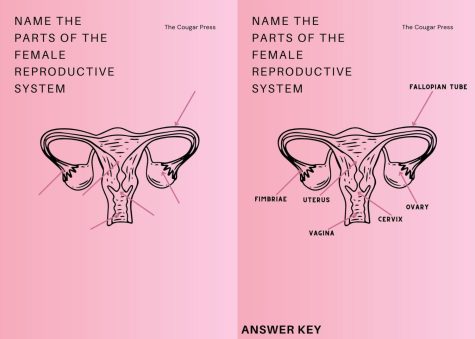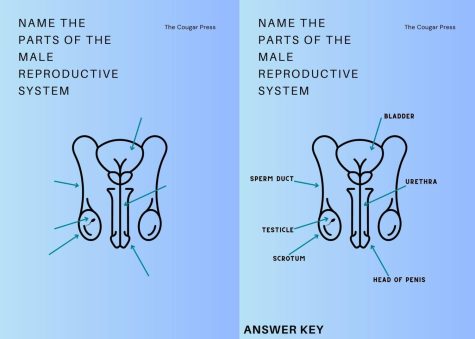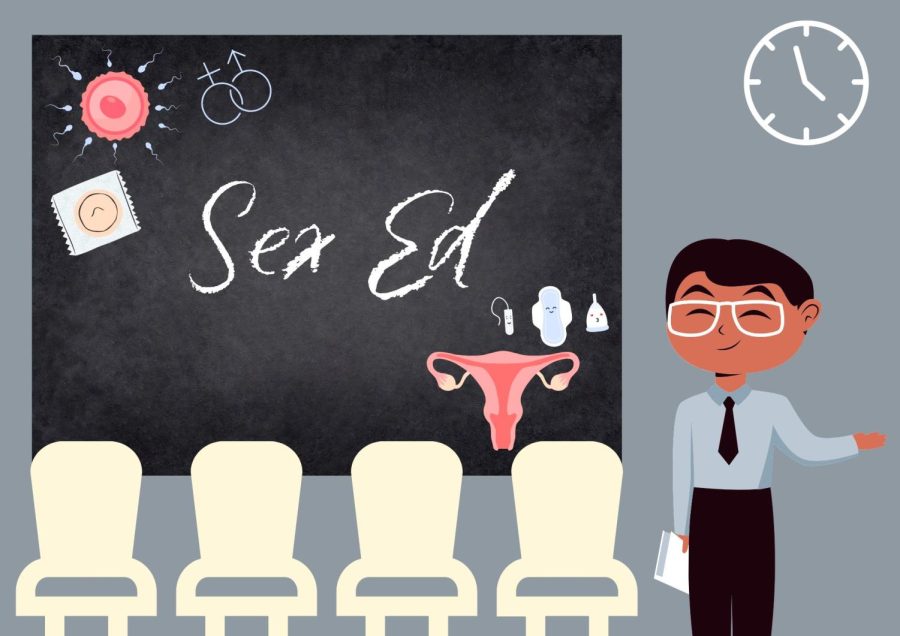Opinion: Let’s talk about sex-ed for all four years of high school
April 25, 2023
Why barely one-quarter of sexual education at VHS just isn’t enough
During their freshman year, VHS students are required to take a course in health. This class is paired with college and careers. Since each course is a semester-long, there is already a shorter time frame to cover a vast area of subjects. Toward the end of the health course, students cover sexual education. As for the rest of high school, a health course for each following year isn’t required, which means that sexual education is seldom taught. This is different depending on what science course you take, but for those not taking a medical class, there is little to no knowledge given regarding it.
So, not only is the overall subject of health crammed into one measly semester, but sex education is crammed into an even tighter time slot. It’s simply impossible to cover all the bases in such a short time.
Jack Rose ’23 said, “I’ve never really had a sex-ed class at VHS. I think it’s something many can benefit from. I think there’s valuable information in any sex-ed course that if you apply in the right way, can be very helpful in everyday life.”
The time allotted for “sex education” – if one can even call it that – consists of a video of a woman giving birth within a documentary, an explanation of what a menstrual cycle is and a demonstration of how one uses a condom and a half-as*** presentation regarding the other ways to prevent pregnancy or STI.

Abigail Block ‘23 said, “I feel like there isn’t really any sexual education [taught at] Ventura High. I honestly only remember one segment from freshman year health class in the one semester that we get, but I feel like for the most part it’s catered towards students that are practicing abstinence and people who don’t partake in any sexual activities and it’s not preparing anyone to engage in those [sexual] activities.”
For the longest time, the practice of celibacy has been the primary response to preventing unwanted pregnancies or STIs. Yet this method is outdated and useless.
Obviously it’s common sense that if one is not sexually active, then they will not be faced with the risks that come with it, but as long as testosterone and estrogen continue to exist, so will the natural human instincts and urges to be sexually active. We need to throw away this dismissive response and instead provide students with methods to practice safe sex as well as actual solutions to turn to when they find themselves in a rut.
Block said, “It isn’t fair and it’s honestly unsafe that educators aren’t teaching anything because then kids go into these sexual situations basically blindsided and uneducated, we’re more likely to make mistakes and get pregnant.”
Deniyah Alvarado ‘24 said, “[Sex education] is basically nonexistent, no one’s really learned anything about sex. I feel like we should learn about sex, we should be educated.”
In all honesty, it’s a complete joke that VHS has gone almost three years without sex ed instruction. The necessity for sexual education exists as long as students grow and curiosity blooms about their sexual orientation and preferences. The need to know about one’s self, inside and out, is important. Even the simple act of putting on a condom or putting in a tampon can be difficult, scary and shameful for some. When young adults find themselves in environments that deprive them of proper information about sexual health and practice, they can turn to other outlets which provide flimsy and incredibly uncredible ideas of what sex is. Therefore, if students are not provided adequate educational opportunities at school to learn about sex and anatomy, then they will have a limited arena of resources to turn to when they have questions about sex and their bodies.

An example of misinformation regarding intercourse and the way it should be – and one that is quite controversial – is porn. The sexual situations depicted by this industry are often unrealistic and heavily overdramatized. Although porn is an outlet for self-pleasure, it is also a manipulative industry that is motivated by whatever peaks interest and income. Porn becomes a danger when the younger generation relies upon it as a truthful depiction of what intercourse is. Despite many websites claiming that they are 18+, anyone can have access, so such said “limits” will not detract underage teens from viewing it. Whatever your opinions are on porn, we believe it is an issue when it replaces proper sexual instruction and is the only means young adults have of what sex is. It creates unrealistic expectations in the bedroom, let alone in romantic relationships, for both men and women.
When Principal Rodriguez was asked for an interview, she responded, “We are working with our current health teachers to get more specific info.”
A four-year education course would provide students with sufficient instruction. The time allocated would allow for thorough teaching to cover each and every base of this complex subject. Young people are one of the most vulnerable groups when it comes to contracting STIs, such as chlamydia and gonorrhea. Teaching students not only how to prevent contracting infections but also the symptoms and how to treat them will create a more open and supportive environment for students at school and students will feel more confident when venturing into romantic relationships with one another. As students progress throughout the course from semesters to grade levels, the subject matter covered can be set to appropriately fit the age group and maturity level of the students. Sexual education matters taught to freshmen will heavily differ from that taught to seniors, but no matter what, we strongly believe every student deserves to know their bodies and to have proper sexual education opportunities. This has been lacking for far too long, and the health and well-being of VHS students is jeopardized as a result of the administration’s failure to address the importance and prominence of sex in the lives of young adults.









![Lindsay Guzik, new assistant principal said, "I am settling in [at VHS] pretty well. I know a lot of the students, so that makes it a little bit easier coming from Cabrillo, and it's been nice to see them all grown up." Photo by: Abraham Kassa](https://thecougarpress.org/wp-content/uploads/2025/09/IMG_9728-300x200.jpg)

John Doe • Apr 27, 2023 at 11:45 am
It’s not “common sense” for minors to be engaging in sexual activity. Sex education is not meant to propel promiscuity, to the dismay of some who view that their temptations and impulses matter more than their rational long-term thinking. Stop trying to justify sex for pleasure– hedonism is not the answer.
How is celibacy or virginity useless or outdated? It’s literally 100% foolproof. Sure, you can use contraception but that STILL has a chance of not working or breaking. The truth is, the kind of people that advocate for this sort of behavior want to use instant gratification. We are not robots that do things because our hormones or our temptations tell us to. We are humans that are smart that realize that we must seek a balance between our intelligence and our emotions. Flat out just telling people to follow their “natural human instincts” is asinine. Most of these people who seek sexual activity are doing so out of lust– not love. Abstinence is a lock on our temptations and we need to keep it that way.
The societal aspect of virginity is the fact that virginity is recognized by sociologists to be a defining factor in quality heterosexual relationships. Highly-religious couples enjoy higher-quality relationships and more sexual satisfaction, compared to less/mixed religious couples and secular couples. (link expunged)
According to W. Bradford Wilcox, women with zero or one previous sex partners before marriage were also least likely to divorce, while those with 10 or more were most likely. These divorce-proof brides are an exclusive crew: By the 2010s, he writes, just 5 percent of new brides were virgins. And just 6 percent of their marriages dissolved within five years, compared with 20 percent for most people.
Interesting how that works? People who never had sex before in their marriage enjoy higher quality and long-lasting relationships?
Virginity is useful as a societal construct and not to be considered unnecessary or antiquated. It’s one of the things that keeps men and women virtuous.
I will say, I appreciate the author(s) in addressing the issue of pornography. Pornography is a degenerate and immoral media that indignities and objectifies men and women. It’s sad to me that people actually justify this, saying that it’s a “form of art” and “people will lose jobs”. Ridiculous. The only reason why the porn industry is so big and successful is that it preys on young and vulnerable men and women and that it gains so much income from it. It’s no different from the drug industry, in that regard. There must be no dancing around the issue– pornography is an evil no matter what form it comes in or whatever context.
some girl • Dec 23, 2023 at 8:55 pm
It’s been months, but this issue is still relevant, and I have some comments to add.
I want to respond to say that it is completely delusional, unrealistic, and dangerous to expect young people to abstain from sex altogether. That simply is not going to happen. We are not a religious society, and we are one that strives for freedoms of choice. It is the responsibility of our public schools to provide the information necessary to prevent health outbreaks and teen pregnancy.
Personally, I only learned in the last year from a friend that STDs can be asymptomatic (she said she’s been telling other friends, and many of them where unaware as well). It’s scary that we don’t teach that, and only show those graphic images of the worst cases of STDs. I can’t imagine how many young people have made the mistake of assuming no symptoms = fine.
We attend a public school, funded by the state. It is vital that we keep church and state separate. Private, religious schools can teach only abstinence if they so wish, but we must demand better sex education from our public schools that isn’t influenced by religion.
You’re right in that celibacy is the only 100% guaranteed way to avoid pregnancy. However, the pill is 99% effective when taken correctly, as are implants and IUDs, according to Planned Parenthood. It isn’t enough of a difference to discourage sex.
W. Bradford Wilcox is a conservative Latter-Day Saint leader. I would take anything he has to say about the topic with a grain of salt; he has his own agenda, and his research is funded by conservative groups who do too.
It really is outdated to consider virginity a virtue. There’s no problem with or shame in having sex before marriage, as most do in this day and age. There’s nothing wrong with abstaining either.
According to the CDC, over half of unmarried people 15-20 have had sex. So let’s respect people’s freedom and acknowledge the statistics by adding more depth to our sex ed programs.